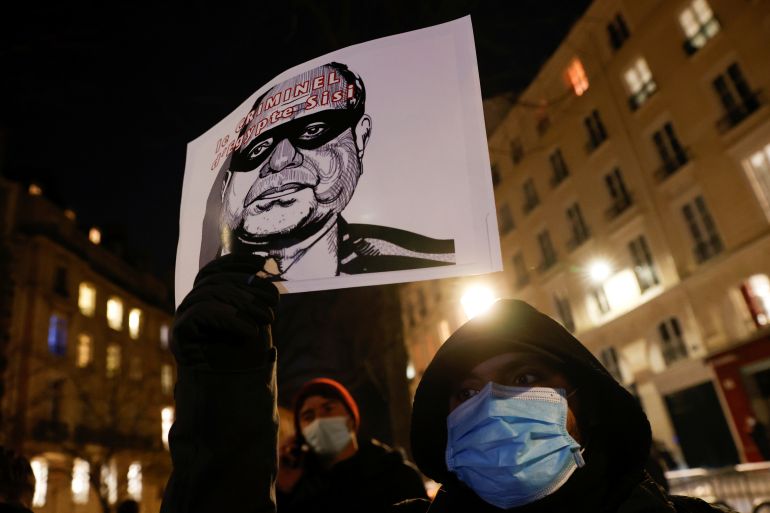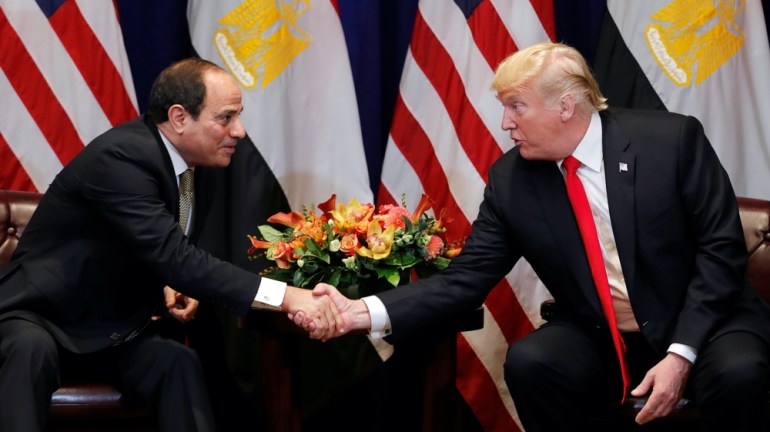Egyptian activists in US say families facing ramped up pressure
Rights advocates and lawmakers are urging US President Joe Biden to pressure Egypt to improve its rights record.

Egyptian rights activists in the United States are accusing the government of President Abdel Fattah el-Sisi of targeting their loved ones to pressure them into silence, spurring calls for President Joe Biden to put pressure on Egypt to address its human rights record.
Sherif Mansour, the Washington, DC-based Middle East and North Africa programme coordinator at the Committee to Protect Journalists, said Egyptian security forces raided three of his relatives’ homes in Egypt since August 20, arresting several people.
Keep reading
list of 3 itemsIn Pictures: Graffiti tells the story of Egypt’s revolution
Flowers, soldiers, days of rage: A picture of Egypt’s Arab Spring
All but one have been released; his cousin Reda was accused of being a member of a “terrorist organisation” and remains in detention pending trial.
“For the first 45 days, we didn’t even know where he was,” said Mansour, who was also charged in absentia with terrorism in his cousin’s case, as were his father and brother. “During his detention, Reda was often deprived of food and medication. It’s only now that they’ve allowed him a monthly visit and he’s been able to send letters to his family.”
Reda’s personal testimony sent to his family revealed that he was interrogated about Mansour’s family in the US and whether he communicated with them on social media or through other means.
“I’ve been purposefully not communicating with my family in Egypt so as not to get them into trouble. It’s been consistent and persistent in the last six months,” Mansour told Al Jazeera.
Thousands detained
The Egyptian embassy in Washington, DC did not respond to Al Jazeera’s request for comment before publication.
In a telephone interview last week with MBC Masr television, el-Sisi responded to the criticism, telling the Egyptian people to be wary of a “foreign conspiracy” subsisting on domestic tension. “Whoever targets me or the regime in Egypt is, in fact, targeting the Egyptian people. This is what Egyptians should know,” he said.
But a coalition of rights groups that includes Human Rights Watch and Democracy for the Arab World Now (DAWN) said relatives of Egyptian critics abroad have increasingly been subjected to arbitrary arrests and prolonged detention without trial or charges.
Ten years after a revolution led to the overthrow of then-President Hosni Mubarak, an estimated 60,000 Egyptians remain in detention after a crackdown on political opponents, including members of the Muslim Brotherhood, as well as human rights and democratic activists.
Many dissidents have had to flee and live in exile. Journalists who sought to uncover government rights violations were systematically targeted.
In order for the Biden administration to succeed in influencing the rights situation in Egypt it's going to have to put its money where its mouth is
“We have seen this increasing pattern of intimidation and scare tactics against families of opponents, including home raids, persecutions, arrests and travel bans,” said Amr Magdi, Middle East and North Africa researcher at Human Rights Watch.
“In the worst-case scenarios, we have seen the arrest of family members. They get arrested and persecutors rubber stamp any charges against them without any evidence and they get detained in endless pre-trial detention.”
Since August, at least four US-based Egyptian activists say their families have been targeted, including the family of Egyptian American rights activist Mohamed Soltan.
Three cousins of Soltan were detained recently during a home raid and were asked about his work as the director of the Freedom Initiative, an independent human rights group based in Washington, DC, HRW reported.
Soltan was a political prisoner in Egypt for two years after he was arrested during a brutal and deadly crackdown on a sit-in at Cairo’s Rabaa Square in 2013. He filed a lawsuit against former Egyptian Prime Minister Hazem el-Beblawi in June in a US court, accusing him of orchestrating his torture in prison.
US-Egypt ties
Amid the reports, rights groups are pushing the newly elected Biden administration to rethink Washington’s relationship with Cairo – the second-largest recipient of US foreign aid since the Egyptian government signed a peace deal with Israel in 1979.
The US has provided Egypt $50bn in military aid and $30bn in economic assistance since 1978, according to US State Department figures, while two-way trade between the two countries totalled $8.6bn in 2019.
Shortly after his election, then-President Donald Trump welcomed el-Sisi at the White House, where he praised him for doing “a fantastic job in a very difficult situation”. The Trump administration refrained from publicly criticising Egypt over its human rights record, and observers are hoping the Biden administration will do more.

“The administration has to make clear to the Egyptian government the steps it can take to address their concerns about rights,” said Timothy Kaldas, a non-resident fellow at the Tahrir Institute for Middle East Policy, a think-tank based in Washington, DC.
“But if they speak very broadly about respecting human rights and democracy and don’t really have very specific asks, it will be more difficult to get some sort of result.”
Biden also faces pressure from within his Democratic Party. US Congressmen Don Beyer and Tom Malinowski, who recently formed the Egypt Human Rights Caucus, have said US-Egypt bilateral relations should prioritise respect for human rights and accountability.
“American interests have not been served by a policy of unconditional support for the Egyptian military, while downplaying the military-led government’s human rights abuses, corruption, and mistreatment of American citizens,” Malinowski said in a statement last month.
“The Egypt Human Rights Caucus will reflect and help shape the growing consensus in Congress that we need to rebalance our relationship with this important country.”
Arms deal
In a July tweet, then-presidential candidate Biden criticised el-Sisi for the arrest of Egyptian activists and the targeting of their families, calling it “unacceptable”. “No more blank checks for Trump’s ‘favorite dictator’,” Biden wrote.
The human rights situation in Egypt was also on the agenda during a February 23 call between US Secretary of State Antony Blinken and Egyptian Foreign Minister Sameh Shoukry.
“The fact that it was raised in the secretary’s first call with his Egyptian counterpart speaks to the priority we attach to this issue,” State Department spokesman Ned Price later told reporters during a news briefing. “That’s where we want to see improvement.
Mohamed Amashah is finally home after 486 days in Egyptian prison for holding a protest sign. Arresting, torturing, and exiling activists like Sarah Hegazy and Mohamed Soltan or threatening their families is unacceptable. No more blank checks for Trump’s "favorite dictator." https://t.co/RtZkbGh6ik
— Joe Biden (@JoeBiden) July 12, 2020
But the day reports emerged that Soltan’s cousins had been arrested, the Biden administration announced a sale of $200m worth of weapons to Egypt.
Price defended the move as a “routine replenishment of defensive weapons”, but HRW’s Magdi said it was “a step in the wrong direction … [that] shows the Egyptian government contradictory messages”.
“Consistency in human rights advocacy is vital,” Magdi told Al Jazeera.
Kaldas questioned whether the sale demonstrates just how far the Biden administration is prepared to go to pair its security priorities with its concerns about rights and democracy in Egypt. “In order for the Biden administration to succeed in influencing the rights situation in Egypt it’s going to have to put its money where its mouth is,” he said.
“It’s going to have to have substantive carrots and it’s going to have to be ready to take away things that the Egyptian government wants and it’s not only weapons and not only money – it’s also diplomatic clout, it’s recognition.”